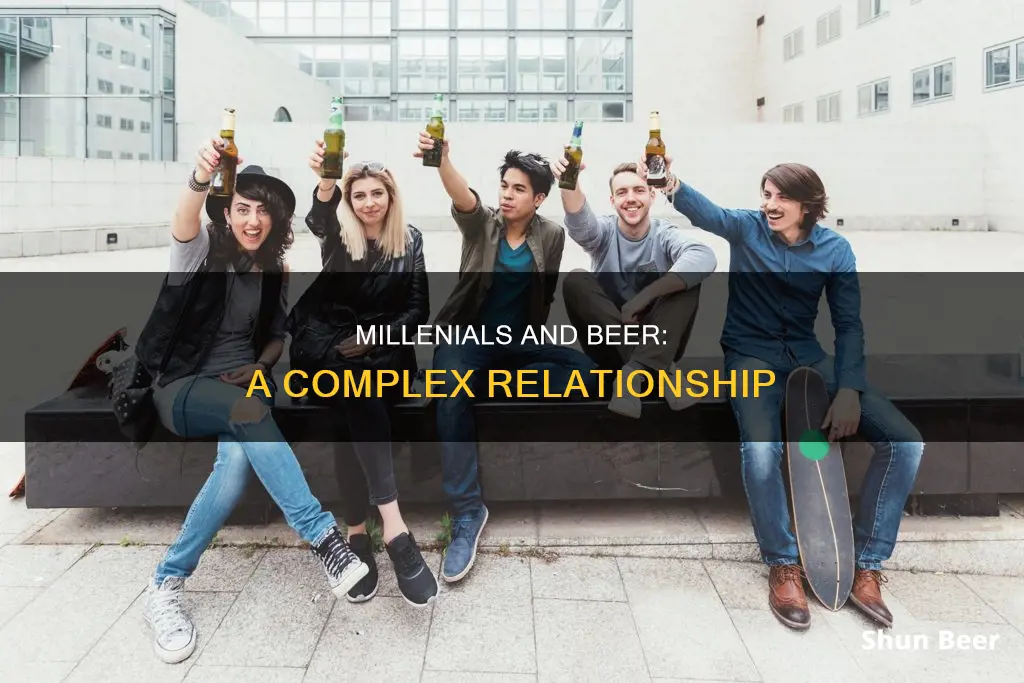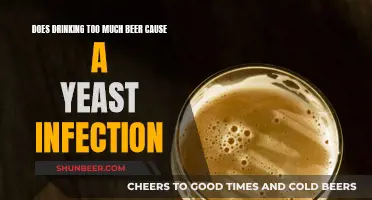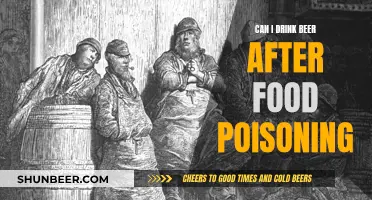
Millennials, born between 1982 and 1999, are less likely to drink as much as their Baby Boomer parents. However, they still represent a significant market for the alcohol industry, with many brands changing their tactics to appeal to this younger demographic. While beer remains popular, millennials have shown a preference for craft beer and hard seltzers, with a recent study suggesting that this is due to the abundance of choice when compared to previous generations.
| Characteristics | Values |
|---|---|
| Preference for beer style | India pale ales (IPAs) |
| Beer brand preferences | White Claw, Heineken, Guinness, Samuel Adams, Miller, Budweiser, Corona, Coors, Stella Artois, Blue Moon, Michelob Ultra, Corona Extra, Busch, Miller Genuine Draft, Dos Equis, Bud Light, Corona Light, Coors Light, Miller Lite, Miller High Life, Michelob Light |
| Drinking habits | Drink less overall, with 40% considered heavy drinkers |
| Alcohol preferences | Prefer lower-calorie drinks with novel flavors, sparking the hard seltzer craze |
| Alcohol spending | 29% on spirits, 41% on beer, 29% on wine |
| Beer spending | 17% on American light lagers, 33% on craft beer |
What You'll Learn
- Millennials prefer IPAs, while older generations opt for lager or ale
- Millennial drinkers are more likely to be health-conscious
- Craft beer is popular with millennials, perhaps due to its abundance and availability
- Millennial drinking habits are a concern for brewers, with 40% of beer industry volume losses occurring in the 21-24 age group
- Millennial drinking preferences are influencing the alcohol industry, with brands changing tactics to appeal to younger drinkers

Millennials prefer IPAs, while older generations opt for lager or ale
Millennials have a reputation for their love of craft beer, but it seems that India pale ales (IPAs) are the drink of choice for this generation. An online survey by market research company Datassential found that millennials (aged 26-40) prefer IPAs, while Gen X (41-57) and Baby Boomers (58+) opt for lager, and Gen Z (21-25) drinkers choose ale, but not an IPA.
The abundance of choice may explain why millennials are drawn to craft beer and, in particular, IPAs. A recent study from the University of Texas at Dallas (UTD) found that the beer landscape that Baby Boomers grew up with was dominated by a small group of macro breweries, whereas millennials have a wide range of neighbourhood craft breweries to choose from. This increased availability of craft beer has likely influenced millennials' drinking preferences.
Millennials' preference for small, local companies is a challenge for large beer brands. The craft beer market has grown substantially over the last decade, and it continues to evolve and expand. In 2005, there were just 405 microbreweries in the US, compared to 1,866 in 2021. This growth has been driven, in part, by millennials' drinking habits.
While Baby Boomers remain loyal to big-name brewers and brands, millennials are more likely to seek out craft beers that align with their values and offer a variety of flavours. This trend is also reflected in their spending habits, with millennials allocating a higher proportion of their alcohol budget to beer than Gen Z, who spend more on spirits.
As the drinking habits of different generations evolve, it will be interesting to see how the beer industry adapts to meet the changing preferences of its consumers.
Beer and a Bulging Disc: Is It Safe?
You may want to see also

Millennial drinkers are more likely to be health-conscious
Millennials, defined as those born between 1982 and 1999, are more health-conscious than previous generations. They are less likely to drink as much as their Baby Boomer parents, with some evidence suggesting they are chasing lower-calorie drinks filled with novel flavours, kicking off the hard seltzer craze. This is reflected in the fact that 40% of the beer industry's volume losses are occurring among drinkers aged 21 to 24.
This health-consciousness also extends to their spending habits, with millennials spending 29% of their alcohol dollars on spirits, 41% on beer, and 29% on wine. In contrast, Gen Z, the generation after millennials, spends 45% of their alcohol money on spirits, 31% on beer, and only 24% on wine.
Millennials' health-conscious drinking habits also influence their preference for craft beer. They gravitate towards small, local craft breweries that offer a variety of choices, including IPAs, which are particularly popular among millennials. This abundance of choice was not available to Baby Boomers when they were forming their drinking preferences, and it has led to a shift in the beer market, with craft beer sales expected to grow.
In conclusion, millennial drinkers are more likely to be health-conscious, and this has had a significant impact on the alcohol industry. Their preference for lower-calorie and lower-carb options, as well as their support for small, local craft breweries, has influenced the types of beverages produced and marketed by alcohol companies.
UK Minors and Non-Alcoholic Beer: Is It Legal?
You may want to see also

Craft beer is popular with millennials, perhaps due to its abundance and availability
Millennials are less likely to drink alcohol than their Baby Boomer parents, but they still represent a significant portion of the market that the alcohol industry needs to cater to.
Millennials are defined as those born between 1982 and 1999. While they may not be drinking as much as older generations, they still represent a large and key part of the market for those in the alcohol industry. Many brands have changed their strategies to attract more millennial drinkers.
The prevailing theory among experts for millennials' preference for craft beer was that they favoured brands that aligned with their values. However, the UTD study suggests that it is not so much that millennials are generationally attracted to craft beers, but rather that they had greater access to these beers when they were forming their preferences. As millennials purchase more craft beer, every other generation has purchased less. In 2018, millennials accounted for 20% of craft beer sales and allocated 34% of their beer budget to craft beer, compared to 20% for Baby Boomers.
Millennials' preference for craft beer has had a notable impact on the beer industry. With more craft breweries popping up in neighbourhoods across the country, the variety of craft beers available to consumers has increased significantly. This abundance of choice, coupled with the accessibility of craft beer, has likely contributed to its popularity among millennials.
Alcohol Poisoning: Is Four Beers Dangerous?
You may want to see also

Millennial drinking habits are a concern for brewers, with 40% of beer industry volume losses occurring in the 21-24 age group
Millennials, born between 1982 and 1999, are less likely to drink as much as their Baby Boomer parents. However, they still represent a significant portion of the alcohol market and are therefore an important demographic for the alcohol industry.
Millennials have shown a preference for craft beer, with 20% of craft beer sales in 2018 coming from those born between 1980 and 1996, who also allocated 34% of their beer budget to craft beer. This is a notable shift from Baby Boomers, who only allocated 20% of their beer budget to craft beer. This preference for craft beer has been attributed to the abundance of choice available to millennials when they were forming their drinking preferences.
However, millennial drinking habits are a concern for brewers, with 40% of beer industry volume losses occurring in the 21-24 age group. This is partly due to millennials prioritising health and choosing lower-calorie drinks with novel flavours, such as hard seltzers. Additionally, millennials have shown a preference for small, local companies, which poses a challenge for large beer brands.
Gen Z, the generation following millennials, also appears to be moving away from beer and towards spirits and American light lagers. This shift further contributes to the volume losses in the beer industry.
Beer and Dengue: Is It Safe to Drink?
You may want to see also

Millennial drinking preferences are influencing the alcohol industry, with brands changing tactics to appeal to younger drinkers
Millennials, defined as those born between 1982 and 1999, are a key part of the market for the alcohol industry. Their drinking preferences are influencing the industry, with brands changing their tactics to appeal to younger drinkers. While beer remains popular, millennials are also exploring alternative alcoholic beverages, such as hard seltzer. This shift in preferences has led to a change in tactics for many alcohol brands, who are now targeting millennial drinkers with new products and marketing strategies.
Craft Beer and Local Favourites
Millennials have shown a preference for craft beer, with research suggesting that this may be due to the increased availability of craft products during their impressionable, beer-drinking ages. A study by the University of Texas at Dallas (UTD) found that the beer landscape when Baby Boomers were coming of age was dominated by a small group of macro breweries. In contrast, millennials now have access to a wider variety of craft beers, including neighbourhood craft breweries. This abundance of choice may explain why millennials gravitate towards craft beer. Additionally, millennials' preference for small, local companies may also contribute to their support for craft beer brands.
Health-Conscious Drinking
As a generation, millennials are known for their health-conscious attitudes, and this extends to their drinking habits. They may opt for lower-calorie drinks with novel flavours or seek out beverages with attributes like zero sugar, low carbs, and natural ingredients. This trend has influenced the development of new products, with brewers expanding their portfolios beyond traditional beer offerings. For example, Molson Coors has invested in non-alcoholic beverage developers to cater to millennials' interest in lower-calorie options.
Alternative Alcoholic Beverages
While beer remains popular, millennials are also exploring alternative alcoholic drinks. Hard seltzer, in particular, has gained traction among this demographic, with White Claw being named the top alcohol brand with millennials. This shift towards alternative beverages has led alcohol brands to diversify their portfolios and develop new products that appeal to millennial tastes and preferences.
Flavour Preferences
Millennials have exhibited specific flavour preferences that differ from older generations. For example, a survey by market research company Datassential found that millennials prefer India Pale Ales (IPAs), while Gen X and Baby Boomers favour lagers. Additionally, citrus was ranked as the top flavour in beer by millennials, followed by berry, apple, and pear flavours. These flavour preferences may influence the development of new beer varieties and the creation of innovative flavour profiles.
In summary, millennial drinking preferences are having a noticeable impact on the alcohol industry. With their health-conscious attitudes, preference for craft and local options, and openness to alternative beverages, millennials are shaping the future of alcoholic beverage trends. Brands are taking note and adapting their strategies to appeal to this influential demographic, leading to a dynamic and evolving alcohol industry.
Beer and Kidney Cancer: Is There a Link?
You may want to see also
Frequently asked questions
Yes, but they are drinking less than their Baby Boomer parents.
Millennials tend to prefer craft beer, with India Pale Ales (IPAs) being the most popular style.
One theory suggests that millennials prefer craft beer because it aligns with their values. Another theory suggests that it is due to the greater availability of craft beer when they were forming their drinking preferences.
Millennials have been linked to the rise in popularity of hard seltzers, with White Claw being the top alcohol brand among this demographic. They also spend more on spirits than previous generations, with 29% of their alcohol budget going towards spirits compared to 41% on beer.
Gen Z drinks less alcohol overall than millennials. They are more likely to stay in with friends than go out, and when they do go out, they tend to drink in moderation. Gen Z is also less likely to drink craft beer and imports, instead opting for American light lagers.







